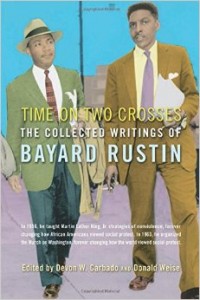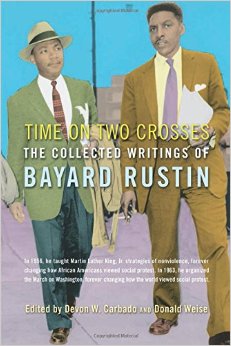 Time on Two Crosses: The Collected Writings of Bayard Rustin
Time on Two Crosses: The Collected Writings of Bayard Rustin
Edited by Devon W. Carbado and Donald Weise
Cleis Press, 355 pages, $16.95, paper
THIS AUGUST marked the fortieth anniversary of Martin Luther King’s “I Have a Dream” speech at the historic civil rights March on Washington. King is rightly hailed as the charismatic visionary who gave the March, and indeed the civil rights movement, its defining metaphors. But there is one lesser-known man who worked behind the scenes, advising King and organizing the March. He worked for the cause tirelessly despite being hounded—by people both within and outside of the movement—for his socialist ideology and his homosexuality. That man was Bayard Rustin, and his lifetime of service in the cause of human rights has never received the recognition it is due.
That may be changing. Rustin’s life is the subject of a documentary, Brother Outsider: The Life of Bayard Rustin, which recently aired on public television stations across the U.S. He has been the subject of a respected biography, and his life has even inspired a stage play. Time on Two Crosses: The Collected Writings of Bayard Rustin is the first book that brings together writings from Rustin’s forty-plus year career as a social activist. The book’s title comes from a 1987 interview with Rustin, but it’s also a deliberate evocation of another book, Time on the Cross, Robert Fogel and Stanley Engerman’s controversial 1974 study of American slavery. It’s an apt title, given Rustin’s struggles in the fight both for racial equality and for sexual freedom.
Rustin had the misfortune to live and work as an openly gay man at a time in American history when such boldness was not rewarded. This fact, in addition to Rustin’s race, his conscientious objection to the Vietnam War, and his socialist beliefs, singled him out for persecution on many fronts. Surprisingly, many of those attacks came from other black leaders in the Civil Rights Movement, who saw Rustin as a liability. Although King himself was disinclined to make much of Rustin’s sexual orientation, he nevertheless had to answer to the larger voice of the movement, and too many people had too many misgivings about Rustin for King to allow him a place of prominence. Though Rustin was pictured as one of the March’s organizers on a 1963 Life magazine cover, his influence within the movement was constantly being weakened by his opponents.
One of the most heroic aspects of Rustin’s life was that he did not allow himself to be defined by one movement or cause, but instead waged a broad struggle for human rights. He worked with energy and passion for a number of oppressed groups, including the Japanese Americans who were placed in internment camps by the U.S. government during World War II. He also spoke out often for gay rights and women’s rights.
Time on Two Crosses brings together a wide array of Rustin’s writings. Arranged both chronologically and thematically, these essays represent everything from Rustin’s early arguments against Jim Crow laws and for nonviolent disobedience—he is credited with introducing King to Gandhi’s philosophy—to his later writings on gay rights and on the condition of Africans. This is a diverse and invaluable collection of writing from one of the 20th century’s most important human rights champions. Perhaps it will help raise the level of awareness of and appreciation for Rustin’s life and work for a new generation of activists.






